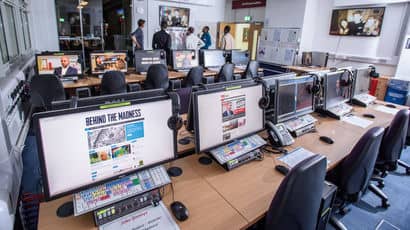Choosing the right IT equipment for university
IT equipment
Our aim is to empower you and put you in control of your learning and digital experience at UWE Bristol. This guide is your tool to make informed decisions about your IT equipment, ensuring you are well-prepared and choose the right tools for your studies.
Online learning is a pivotal part of your UWE Bristol experience. While all campuses offer open-access computers, a personal laptop can provide you with the flexibility and convenience you need, putting you in the driver's seat of your learning journey.
We understand that personal preference and budget are significant factors in your equipment choices. However, investing in equipment that is fit for purpose from the outset will save you time and money and ensure you are well-prepared for the software you are likely to use in your future career, giving you a head start and boosting your confidence.

The software you'll need to use
Understanding the software requirements for your course is the first step, as this will decide the operating system and hardware choices.
- Find out what software applications you'll be using. Your 'Preparing to Study' communications may include this information or ask your programme leader.
- You will have access to many university-licensed applications and free applications for your course, both on and off campus.
- You will need to install some software. Many applications are available as both web apps (hosted and used in the cloud) and desktop apps (physically installed on your computer and can be used offline). You may need both.
More information about using the software at UWE Bristol, including specialist software and offers for students, can be found via software.
An operating system to support the software
The operating system will be decided by what software you'll be running. Will you need a computer with Windows, macOS or something different?
Some points to bear in mind with the software used in your course:
- You will need the latest version of your operating system.
Please note: Mac devices older than 2011 will not updated beyond v10.15 or have the latest web browser. You can find system requirements via Chrome Enterprise and Education Help. - Most applications will run on Windows 10 and Windows 11.
Please note: for devices running Windows 11, please see Microsoft's official guidance regarding its limitations. - Many specialist applications will NOT run on macOS. Check the software required for your course before choose to purchase a Mac.
- Chromebooks and iOS/Android tablets will not run most specialist applications.
- You cannot install Windows on Mac devices with Apple processors, which includes most Mac laptops purchased in the last 2-3 years.
The hardware to run it
The specifications of the laptop that you will need depends on the software packages you will use and the complexity of the tasks you will need to do. Your programme leader will advise of specific course requirements. As a guide:
Core specification - to access the University's core digital learning systems (Microsoft 365, Blackboard, Collaborate, Panopto, Pebblepad) and light use of specialist apps like SPSS or NVivo:
- i3 (9th generation) or Ryzen 3 (3rd generation) processor
- 8GB memory
- 128GB solid-state storage
Enhanced specification - for more advanced data processing, image editing or basic video editing, application development:
- i5 (9th generation) or Ryzen 5 (3rd generation) processor
- 8GB memory
- 256GB solid-state storage
Intensive specification - for intensive data processing, video editing, rendering, visualisation, small-scale AR/VR, complex application development:
- i7 (9th generation) or Ryzen 7 (3rd generation) processor
- 16GB memory
- 512GB solid state-storage
Choosing the right device for your studies
Thinking about these questions will help you to choose the right device you'll need to complete your studies.
- Will the operating system run the software you need?
Devices like Chromebooks and tablets can seem more affordable, however, they are not usually able to run any specialist software required by your course. - Does it have enough memory and storage space?
- Will the processor cope with what you need to do?
- Does it have a microphone and camera?
These are essential for engaging with online learning. - Does it have enough USB sockets?
To plug in things like webcams, headsets, and other peripheral devices. - Is the screen size big enough?
Some software packages specify minimum screen resolutions. - Is it easy to carry around?
Lightweight devices are great for commuting, but they might cost more or have shorter battery life. - Do you need a new device?
Some basic maintenance tasks or a simple hardware upgrade might boost performance and give an old device new life.
Please note: the University does not endorse any scheme or supplier. This guide is to help you so you can make the best-informed choice you can when buying IT equipment for your studies.
Funding and scholarships
Information for prospective students, including advice on undergraduate and postgraduate funding and financial support from UWE Bristol.
FundingOther things to consider
The software, operating system and hardware are the three main areas to focus on. Below are some other things you may be thinking about and some useful tips to bear in mind.
Accessories
- Make sure specific accessories are compatible with the computer (for example, an ergonomic mouse, specific language keyboard, etc).
- Check that removable media are compatible with the ports on your computer and they're big enough for what you need to put on them (for example, external hard drives, etc). To follow best practice, you should encrypt these using our guidance.
- Sustainability is embedded in UWE Bristol's culture. If you're thinking about buying a personal printer, we would encourage you to question whether you really need one or if there is an alternative option (for example, printing on campus).
Aftercare
- Make sure you know who you can contact or where you can go in case something goes wrong with your equipment.
- If you are considering insurance and after-sales support packages for peace of mind, you should understand this can be an added cost.
- UWE Bristol IT Services can offer limited advice for personal devices and accessories, so it's important that you're covered for repairs, loss, or theft.
- You should always keep your operating system updated to ensure reliability and security.
Internet access
There are all sorts of broadband deals around and it's worth checking the guidance from Ofcom about connections and what will be suitable depending on your accommodation and requirements.
- Online gaming, streaming movies, and downloading large files will have an impact on what you use and what's left for teaching and learning activities.
- For advice on how to improve your broadband speed, we recommend reading Ofcom's broadband speed guidance.
- You could also consider using mobile broadband (over 4G/5G networks).
- Be sure to check network coverage, usage limits, and minimum contract period before taking out any service.
- The recommended browsers for using most things, including Blackboard, Collaborate and AppsAnywhere, is Chrome or Edge.
Anti-virus
- It is strongly recommended that you have an anti-virus software package installed, regardless of the operating system you are running on your computer. Mobile devices normally include built-in protection.
- Make sure you restart or shut down your computer regularly to ensure it receives vital security and software updates that will help keep your information safe.
- Shutting down will save a bit of energy, too. Good for the environment, good for you.
- More information can be found in our dedicated guidance on protecting data and devices.
Support for personal devices
'Personal devices' can be defined as any devices not owned or managed by UWE Bristol.
We can offer limited help to students and staff for issues with their personal devices used for your work and studies. We can't guarantee that all devices will be compatible with our network and services or meet our security requirements.
We're happy to support and offer guidance in:
- connecting to eduroam (the UWE Bristol wifi network)
- supporting the installation and launching of software delivered by UWE Bristol systems (including AppsAnywhere, MECM and JamfPro) on compatible devices
- issues with Blackboard/UWE Bristol remote learning tools
- remote access to UWE Bristol business systems
- UWE Bristol accounts and security
- Printing university work via the Printme service.
Unfortunately, we're unable to offer support for:
- hardware troubleshooting on non-UWE Bristol devices
- personal security/antivirus applications
- accessing personal data/passwords
- home wifi and networks
- issues with software related to your operating system or the software provider. For example, conflicts with other software (including previous versions) or hardware, making registry changes, installing software not provided by UWE Bristol, or supporting how to use the software itself
- software not provided by UWE Bristol
- the installation of operating systems on any personal device
- support of devices without admin access or managed by other IT departments.
You may also be interested in

Getting started with IT at UWE Bristol
Our Quick Help Guide for getting started with IT at UWE Bristol.

eduroam - free campus wifi
How to connect to the free campus wifi (eduroam).

Software
Find out how and where to access software on-campus, off-campus and at home.

Microsoft 365
Information on Microsoft 365 features and how to install them, including: email, Microsoft Office and OneDrive.
